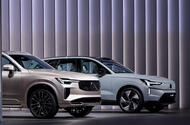Car Makers Extend the Life of Combustion Engines Amid EV Hangover

After the surge in Tesla’s share prices in 2021, which valued the electric car maker at over one trillion dollars, car manufacturers are now reconsidering their plans to phase out combustion engines.
The Initial Optimism
The impressive performance of Tesla in the stock market created a wave of optimism among car companies, leading them to set ambitious targets for electric vehicles (EVs). Brands like Bentley, Cadillac, Ford, Lexus, Mercedes-Benz, Vauxhall, and Volvo announced plans to go fully electric within the next decade, either globally or in specific markets such as Europe.
However, the euphoria surrounding EVs has subsided as the reality of slower EV sales growth sets in. Car manufacturers cannot afford to slow down their EV development due to regulatory requirements. The UK’s ZEV mandate aims for an 80% EV sales mix by 2030, while the EU requires a 55% reduction in average CO2 emissions from 2021 levels.
Reassessing the Plans
Many car companies have started to revise their original commitments to ensure compliance with regulations while managing market demand. Let’s take a look at where some major players stand now:
Ford
Ford initially pledged to go all-electric in Europe by 2030 after investing $1 billion in its Cologne plant. However, the company has now expressed openness to selling hybrids beyond 2030 if there is strong demand.
Volvo
Volvo announced its intention to transition to all EVs globally by 2030, with half of its sales being EVs by 2025. While Volvo is well-positioned for the shift, the company’s CEO recently acknowledged that the transition may be closer to 90% by 2030 due to the non-linear nature of the electrification process.
Bentley
Bentley committed to an all-EV future after 2030 but faced setbacks in the launch of its first EV, which has been delayed until late 2026. The company has shifted its focus to plug-in hybrids as a bridge to EVs.
Mercedes-Benz
Mercedes-Benz set ambitious goals to go all-EV by 2030, but sales figures have led to a reassessment. The company now plans to sell combustion-engined cars well into the 2030s.
Cadillac
Cadillac initially planned to shift to all-EV sales by 2030 but has since adjusted its strategy to align with customer preferences.
Remaining Committed
While some car manufacturers are reevaluating their plans, others remain steadfast in their commitment to electric mobility:
Stellantis
Stellantis, the parent company of brands like Vauxhall, Alfa Romeo, DS, and Fiat, maintains its plan to go all-EV in Europe by 2030 across all brands. Vauxhall even aims to achieve an EV-only lineup by 2028.
Rolls-Royce
Rolls-Royce has committed to going all-EV by 2030 and has reaffirmed its target this year.
Nissan
Nissan aims to go all-EV in Europe by 2030, despite current low EV sales. The company remains focused on achieving its target and aims for 43% EV sales by 2026.
Lexus
Lexus, owned by Toyota, maintains its promise to go all-EV in China, Europe, and the US by 2030, with global sales following by 2035.
Relaxed Plans
Some car manufacturers have adopted a more relaxed approach to EV adoption:
Volkswagen
Volkswagen aims for EVs to exceed 70% of sales in Europe by 2030, with the US and China reaching 50%. Despite recent setbacks, the company believes it can achieve its targets.
Audi
Audi plans to go all-EV globally by 2033 and has not pushed back on this commitment.
Porsche
Porsche aims for “more than” 80% of its cars sold by 2030 to be electric, allowing the brand to continue selling combustion-engined 911s while transitioning other models to EVs.
Toyota
Toyota aims for zero-emission sales in Europe by 2035, aligning with the EU’s goals. However, the company has scaled back its plan to produce 1 million EVs globally in 2026.
JLR
JLR plans to achieve 60% battery electric vehicle (BEV) sales by 2030 and phase out combustion-engined models globally by 2036. The company recently announced the need to extend the production of combustion-engined models to meet market demands.
BMW
BMW expects “at least” 50% of its global sales to come from EVs by 2030. The company has taken a cautious approach and acknowledges that the actual figure may vary across different markets.
While car manufacturers are adjusting their plans in response to market realities, the transition to electric mobility remains a priority. The future of the automotive industry is undoubtedly electric, but the path to full electrification may not be as straightforward as initially anticipated.

